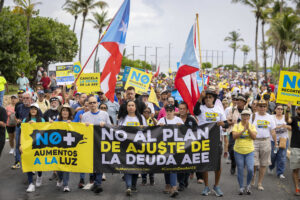A 21st Century Left Rises: Syriza’s Victory and Its Relevance for the U.S. and the World
A question looms large in the wake of the Greek elections: Can democracy defeat the rule of the 1 percent? Syriza leader Alexis Tsipras speaks to his supporters outside Athens University Headquarters following a landslide victory. AP/Petros Giannakouris
Syriza leader Alexis Tsipras speaks to his supporters outside Athens University Headquarters following a landslide victory. AP/Petros Giannakouris
By Alan Minsky
The Greek election Sunday night produced a historic moment, one that millions of people have long awaited: Syriza’s triumph was the first time that a radical-left party has won an election in Europe since the Cold War began (and arguably, ever). The euphoric celebrations in Athens came as no surprise — very little lifts people’s hearts like the dream of a truly egalitarian society.
Of course, after five years of economic austerity, life in Greece these days is more nightmare than dream.
Now that the Greek people have defied the global ruling class by electing Syriza, the question shifts to whether the coordinated forces of global neoliberal capitalism will allow an alternative economic model to take root, one that prioritizes the welfare of the common people over that of the 1 percent. What happens next in the country where democracy was born is of the utmost importance to people around the world, including in the oligarchic United States.
Before addressing the extremely difficult circumstances facing the next Greek government, let’s stay focused on why this moment is so huge — and not just because it will roil international markets and destabilize the euro. Those things are very important, but let’s think even bigger.
Syriza’s triumph throws into clear relief the most important political issue of our time. Is it possible for a left political formation to challenge, win victories against and ultimately overthrow the dominant economic and political paradigm of the past four decades? To be clear, I’m referring to the Reagan/Thatcher/Clinton/Blair neoliberal order, aka contemporary globalized capitalism. Furthermore, if victories are possible, what would such a left look like? Could its vision for a better tomorrow capture the imagination of the world’s people? How would addressing climate change be central to its program? And what impact might this political situation have on domestic politics in the U.S.?
All of us, everyone in the world today, have been living through a three-decade-long counterreaction to a historical arc with its roots in the European revolutions that began in the late 17th century. Viewed from this broad perspective, the major societies of Europe and what we know as the “West” have generally evolved from autocratic feudal regimes in which very few people held economic and political power toward greater democratization (keeping in mind, of course, their brutal, and anything but egalitarian colonial projects). In other words, in Europe, the USA and Japan wealth became more equitably distributed over time and more people participated in deciding how society was run.
This progressive arc continued, in fits and starts, up through the 1970s, at which point the “First and Second World” countries had huge middle classes whose political influence reflected their shared prosperity, in marked contrast to previous eras. If the “left” is understood to be a political force committed to greater economic and political democratization, then this three-century-long arc can be understood as the product of a succession of victories for the Left.
Then came Margaret Thatcher, Ronald Reagan, Milton Friedman and friends.
For the past three and a half decades, the left in the Northern Hemisphere has failed utterly at presenting a vision of a more progressive and equitable society that could garner enough support to counter the neoliberal behemoth that has been rolling back the gains of the past few centuries. In retrospect, the left proved irresistible, and was ascendant in aristocratic and oligarchic societies (the success of the Latin American left of the past two decades can be understood in this light). But once a substantial, prosperous middle class emerged, the socioeconomic left has had no winning vision for moving beyond the middle-class plateau toward an even more egalitarian and less exploitative society. In the wake of this absence, neoliberalism has turned back the tide, and we now live in a society once again dominated by an extremely small elite who have astronomical wealth and a monopoly on political power. The masses work longer for less and are expected to accept their near-absolute disenfranchisement. To make matters worse, this reactionary order dominates a now-globalized economy.
This is not to say that significant progressive victories did not occur over the past four decades in the world’s wealthiest countries. They did, mostly in the struggles against racism, sexism and homophobia. But these gains have occurred at the same time as a severe trend toward the consolidation of wealth and political power in the hands of the few. In this regard, the very real persistence of racism, sexism and homophobia should come as no surprise, since the empowered elite remain overwhelmingly white, male, straight and very wealthy. Clearly, a successful 21st century left must assure full economic and political empowerment for all the people from previously marginalized social groups. As yet, no such left has emerged to challenge for power.
We remain stranded in a neoliberal world in which Marxist philosopher Slavoj Zizek aptly observes, “We can more easily imagine the end of the world than the end of capitalism.” In the current era, the lapdogs of the 1 percent insist there is no alternative, and the left has had no winning response.
This is where Syriza comes in.
Perhaps the best way to understand what Syriza represents is to recognize the forces aligned in opposition, nothing less than the major European and international governing institutions of contemporary globalized finance. These are the International Monetary Fund, the European Central Bank and the German government (as the dominant player in the European Union), collectively known as the “Troika.” Compared to these titans, Syriza may seem a feeble, dreamy Quixote. But the problem for the Troika is that Syriza represents the interests of not only the Greek people, but all Europeans who fear that their middle-class societies are crumbling due to neoliberal policies in which wealth inequality increases as social services decline. Many want to combat the shattering of the post-World War II European social contract that produced the greatest prosperity and general welfare in the history of the Continent.Over the past three years, spokespeople for the Troika have nakedly stated that a Syriza victory would lead to greater punishment for the Greek people. Once the snap elections for Jan. 25 were called, a barrage of propaganda poured forth from Brussels and Berlin, warning that electing Syriza would destroy the continent-wide dream of a unified Europe, as well as make the past five years of Greek suffering seem like a cakewalk. Syriza’s leader, Alexis Tsipras, bravely maintained that he could call their bluff, and on Sunday the Greek people voted against the Troika as Syriza finished first in the election by a wide margin and has now formed Western Europe’s first truly anti-neoliberal government in the past few decades.
What happens next? The circumstances of the Greek crisis were dramatically altered only four days before the Greek elections, when the head of the European Central Bank, Mario Draghi, announced a continent-wide Quantitative Easing (QE) program. The plan is to create 1.1 trillion euros to help the stalled European economy. Syriza’s economists and Tsipras himself had been calling for just such a move, as access to the QE money would substantially lessen the burden of Greece’s debt. However, Draghi shamelessly announced that QE money was not likely to be available to governments that refused to continue programs of economic austerity that were initiated (under pressure from the Troika) as preconditions for earlier loans. In other words, if the Greek conservatives won, they’d get the (essentially free) QE money, but Syriza would get it only if it abandoned its promises to the Greek people and continued the hated austerity regime.
In short, Draghi’s words amounted to a multibillion-euro bribe, beseeching the Greek people to reject Syriza, which shows the lengths that the European establishment will go to in order to prevent the implementation of popular progressive-left policies. Given that Syriza was an advocate of the very QE program that was adopted (minus the exclusion of Syriza, of course) further suggests that what the European elites perhaps fear most is a successful left-wing government in Greece. To make matters worse for Syriza, the releasing of the QE money makes it easier for the rest of the EU to absorb Greece’s exit (the previously dreaded “Grexit”) from the common currency, which could happen if the country is forced into an un-negotiated default on its debt — something that Tsipras and the majority of the Greek people want to avoid.
Which perhaps brings us to the most important question about Syriza: What can a left government in a small country of 12 million people do to take on the coordinated forces of global capitalism? This is, of course, something we will all learn over the coming months. But looking at Syriza’s policy platform, its immediate proposals seem quite modest for something that was so feared by the powerful.
Syriza has maintained throughout this election cycle that it wants Greece to remain within the European Union, and to do so would agree to pay back at least part of its debt while seeking only partial debt relief, in largely unthreatening ways that could be facilitated by the very quantitative easing that the ECB initiated a few days before the election. However, Syriza calls for something that is at the root of its popularity with the Greek people, but which utterly cannot be tolerated by the neoliberal rulers of the new Europe. That is the reversal of domestic austerity policies, by taking actions such as reinstating the minimum wage, once again respecting collective bargaining agreements, and expanding public programs and infrastructure. Indeed, while Syriza’s core members have Marxist backgrounds, their immediate economic program is little more than progressive Keynesian social democratic proposals adjusted for a crisis situation. No Joe Stalin, that. More like a modest FDR trying to alleviate the immediate suffering of people, but 100 percent unacceptable to Angela Merkel’s crew.
Opposing austerity means nothing more than bringing back the mainstream policies of mid-20th century industrial societies, but that represents an existential threat to the logic of neoliberalism and must be drowned in the bath. Thus, even before Syriza has a chance to introduce modest social democratic policies (which remain in place in Northern European countries), let alone anything more radical, Tsipras and Syriza will spend their initial days, weeks, even months in government in a diplomatic trial by fire, attempting to win concessions from the (hostile) Troika in order to end domestic austerity programs without being expelled from the euro currency or going bankrupt.
So, returning to the issues raised earlier in this essay, how then is Syriza a beacon of light for the people of the world, aspiring for an even better society than the social democracies of midcentury Western Europe, the United States and Japan? First, let’s understand what Syriza inherits as a result of the cruel austerity regime that has led to an unprecedented social crisis entering its sixth year: consistent 25 percent general unemployment, more than 50 percent youth unemployment, a widespread exodus of Greek youth to other countries in pursuit of jobs, the loss of health care for a third of the population, the same portion of the population below the poverty line, the appearance of long food lines for the hungry in Greek cities, and the growth of a virulent fascist movement. While it’s true that significant advances by the left across history have occurred on account of crises (e.g. the New Deal, the Russian Revolution and so on), Syriza’s appeal, along with the spectacular growth of its Spanish ally Podemos, is about more than just alleviating the crisis — it’s about a common-sense vision for a better, fairer society that goes beyond Europe’s progressive social democracies of the second half of the 20th century. And herein lies the tremendous promise of this moment: Out of crisis, an empowered left may be born that not only takes on neoliberalism, but also raises the specter of something truly worth fighting for, the most humane and egalitarian technological societies yet.Even Syriza’s advocacy of Keynesian policies is cast as championing democracy in a way that’s a direct challenge to the Troika. In an era when neoliberalism has been exposed by its internal crises and the fact that it serves only the few and not the many, Keynesian programs can be seen as reasserting the role of democratic decision-making in humanizing the economy. After all, John Maynard Keynes called for government intervention in the economy, and Syriza is proposing exactly that. That’s people power over money power, and the party made it a main plank in its platform.
Conspicuously absent from Syriza’s program is anything resembling an Eastern European communist command-economy strategy, and this brings us to the core reason that Syriza has revolutionary promise. The party (and its movement) is very much a 21st century radical left political formation. It is informed by a version of socialism that resonates more with the anti-globalization movement’s participatory “another world is possible” vision than the Soviet Union’s top-down “actually existing socialism.” (Indeed, there remains a Soviet-modeled Greek Communist Party, the KKE, that will win seats in Parliament and that views Syriza as its mortal enemy). Many humanists and leftists around the world breathed a sigh of relief when the Soviet Union collapsed — finally they dreamed they would be able to work toward a socialist future unburdened by the horrors and stigma of Soviet totalitarianism. Thus, for Syriza, countering neoliberalism with classical Keynesian policies that previously had produced the most egalitarian and prosperous societies to date is merely the foundation point from which to build that other possible world.
Syriza and Podemos represent the coming of age of a post-Soviet era European radical politics. So, yes, while Syriza’s current electoral platform focuses almost exclusively on the pressing needs of the Greek crisis, the deeper politics of Syriza are rooted in working-class empowerment and the participatory democracy of social movements (as exemplified by the network of cooperatives that have emerged in Greece during the crisis). These politics are very 21st century: They are distinctly anti-authoritarian, internationalist, for environmentally sustainable development, for clean energy, for free public education through college, they’re anti-racist, anti-war and anti-economic inequality. They are OK with markets within limits and regulations, trust science and posit that living in a technological society means that the benefits of increased labor productivity should assure that no one has to work excessively just to scrape by, and no one has to be poor (Podemos, Syriza’s Spanish ally, which is also soaring in the polls, is even calling for experiments in a humanist prosperity that rejects capitalism’s “growth at all costs” ethos). And yes, the party is pro-democracy, with faith in social movements and local organizations to make decisions about their communities.
It’s not unlike what we heard being promoted when the turtles and the Teamsters marched together in Seattle, which finally brings us back to the United States.
Two and a half months ago, immediately following the crushing defeat suffered by the Democrats, I wrote an article for Truthdig calling for Americans to use the Progressive Caucus in congress as a springboard to take over the Democratic Party and reinvigorate a progressive-left movement in the realm of electoral politics (paralleling the tea party challenge to the GOP). Syriza’s victory in Greece, the spectacular rise of Podemos in Spain and even the surge of the Greens in England show that this is not a pipe dream — millions upon millions of Americans agree with a progressive-left program for the simple reason that it’s a sane, common-sense vision for dramatically improving our society, which means dramatically improving the lives of the majority of people.
Electoral rules in the U.S. are different from the parliamentary systems of Europe, which is a huge barrier to third-party success here. Still, the key to an electoral strategy is the consolidation of a left-progressive electoral movement, which could include Democrats and non-Democrats (of course, fighting for electoral reform is an essential plank of such a movement). After all, Bernie Sanders founded the Progressive Caucus and he’s not a Democrat himself, even though he caucuses with them in the Senate.
American “millennials” are overwhelmingly progressive, but their near-total absence from the polling places in the midterm election betrayed their dismay with the current, flaccid Democratic Party. In a world of global interconnectivity, progressives can easily spread word of a charismatic left inspiring a part of the world roughly as prosperous and “developed” as the U.S. We need a left that won’t squelch innovation or attempt to control every aspect of our lives, but rather is committed to a fuller version of freedom than currently on offer in America, a left that can be readily translated to this country where millions know in their hearts that they don’t have to live in a race- and class-based caste system, in debt servitude to oligarchic masters, while burning ourselves off the planet. We know that another, much better world is possible.
On Sunday, the Greeks proved that their invention — democracy — still terrifies oligarchs and can challenge the rule of the global one percent. It’s a brilliant starting point.
Alan Minsky is the program director of KPFK Radio Los Angeles and a frequent contributor to Truthdig.
Special thanks to Meleiza Figueroa for her research assistance.
Your support matters…Independent journalism is under threat and overshadowed by heavily funded mainstream media.
You can help level the playing field. Become a member.
Your tax-deductible contribution keeps us digging beneath the headlines to give you thought-provoking, investigative reporting and analysis that unearths what's really happening- without compromise.
Give today to support our courageous, independent journalists.






You need to be a supporter to comment.
There are currently no responses to this article.
Be the first to respond.